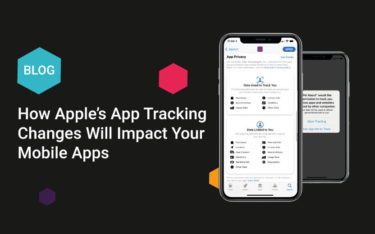How Apple’s App Tracking Changes Will Impact Your Mobile Apps

Poq iOS and mobile marketing experts recently hosted a webinar with mobile measurement partner, AppsFlyer, to help clients understand Apple’s upcoming iOS 14.5 changes to its Identifier for Advertisers (IDFA) in-app privacy tracking feature.
Sheenu Aggarwal, App Marketing Specialist Partner, Poq; Joshua White, iOS Tech Lead, Poq; and, Russell Burden, Director of Partner Development, AppsFlyer, discussed the impact of these changes on mobile marketing and the appcommerce customer journey.
As outlined in Poq’s recently published IDFA FAQs, Aggarwal explained that Apple has made the IDFA explicitly opt-in, giving users the option to consent to sharing their IDFA with apps. This is designed to increase transparency and privacy for consumers and their data.
“On the other side, this means a more complicated future for advertisers, with massive challenges and limitations to mobile measurement and targeted advertising,” she said. “As in the past, the trend towards privacy usually correlates with advancements in data complexity.”
Understanding SKAdNetwork impact
Joshua White, iOS Tech Lead, Poq then outlined what Poq has done in response. “The tracking prompt is an optional feature, and not shown by default (where the IDFA is otherwise nulled),” he said. “It’s also easy to implement if you require the IDFA, and Poq clients should contact their Customer Success manager to find out more.”
He added that Poq has integrated Apple’s new AppTrackingTransparency framework and that third-party software development kits (SDKs) for the likes of Facebook, using Apple’s SKAdNetwork, are up-to-date when an app goes live with Poq’s v18.1 platform or higher.
While app analytics are mostly unaffected by the IDFA, the same cannot be said for mobile app marketing measurement. Aggarwal pointed out that SKAdNetwork attribution relies on networks integration, which offers limited measurement and less timely and granular reporting.
Russell Burden, Director of Partner Development of mobile measurement partner AppsFlyer, was on hand to explain why Apple’s changes underscored the importance of the recent partnership announced with Poq. “We work with over 8,000 media networks, so clients can partner via one SDK,” he said.
Prioritizing mobile measurement partners
Burden agreed with Aggarwal that SKAdNetwork limitations meant app owners needed to work more closely with measurement partners, like AppsFlyer. “Our growing list of partner integrations, which includes Facebook, Snapchat and Twitter, ensures that advertisers can continue to work with their chosen partners seamlessly to measure iOS campaigns,” he said.
“Co-operative relationships in the SKAdNetwork era mean sharing conversion value schemas and postbacks in a timely manner,” he added.
AppsFlyer has recently also launched an integrated SKAdNetwork solution, SK360. It provides a full suite of reporting coverage, from conversion value mapping to fraud detection and predictive lifetime value (LTV) Analytics, which Poq clients can take advantage of via AppsFlyer’s integration with the Poq platform.
Burden also revealed the results of new AppsFlyer research released the same day that suggested IDFA opt-in rates are high, at 41% on average. “It rises even higher with retail apps,” he concluded, “suggesting they’re doing a good job of engendering trust.”
If you missed Poq’s IDFA webinar, you can catch up on-demand here.

